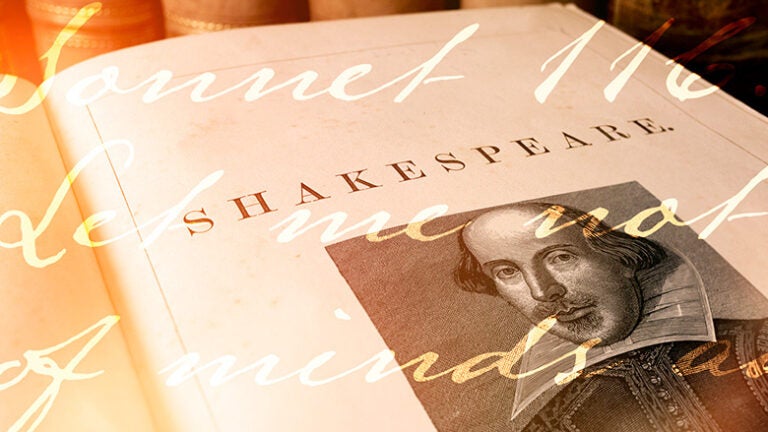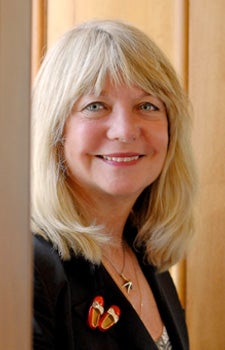
5 favorite love poems in honor of Valentine’s Day
What love is not, what love is, who is loved and who is lost. Poetry is solace for wounded hearts, and joy for the most ardent.

Carol Muske-Dukes photograph by Carlos Puma
Carol Muske-Dukes, professor of English at USC Dornsife College of Letters, Arts and Sciences and former Poet Laureate of California, is the author most recently of Blue Rose (Penguin Books, 2018), her ninth verse collection. She dedicated her collection Sparrow (Random House, 2003), a work of love and grief that was named a National Book Awards finalist, to her late husband, actor David Coleman Dukes.
Five poems are among the first that came to mind as she considered her favorite love poems for Valentine’s Day.
William Shakespeare’s Sonnet 116 is at the top of her list. She calls it “the most moving and eloquent of love poems because it states clearly what love is not, and then powerfully, what love is.” Many couples have added this poem to their wedding vows, notes Muske-Dukes, but she also sees the poem as a kind of manifesto. “Shakespeare says: If I got this wrong, I never ‘writ’ and no one ever loved,” she said.
Let me not to the marriage of true minds
Admit impediments. Love is not love
Which alters when it alteration finds,
Or bends with the remover to remove.
O no! it is an ever-fixed mark
That looks on tempests and is never shaken;
It is the star to every wand’ring bark,
Whose worth’s unknown, although his height be taken.
Love’s not Time’s fool, though rosy lips and cheeks
Within his bending sickle’s compass come;
Love alters not with his brief hours and weeks,
But bears it out even to the edge of doom.
If this be error and upon me prov’d,
I never writ, nor no man ever lov’d.
Emily Dickinson’s poems address a range of themes. The misconception about Dickinson as out of touch with the world is wrong, Muske-Dukes says. “She was intense and passionate.”
Wild nights! Wild nights!
Were I with thee,
Wild nights should be
Our luxury!Futile the winds
To a heart in port —
Done with the compass,
Done with the chart.Rowing in Eden!
Ah! the sea!
Might I but moor — tonight —
in thee!
Joy Harjo, a member of the Muscogee Nation in Oklahoma, is both a poet and a musician. Muske-Dukes finds Harjo’s music “in evidence in this poem about love for nature — a bird!”
We watched her grow up.
She was the urgent chirper,
Fledgling flier.
And when spring rolled
Out its green
She’d grown
Into the most noticeable
Bird-girl.
Long-legged and just
The right amount of blush
Tipping her wings, crest
And tail, and
She knew it
In the bird parade.
We watched her strut.
She owned her stuff.
The males perked their armor, greased their wings,
And flew sky-loop missions
To show off
For her.
In the end
There was only one.
Isn’t that how it is for all of us?
There’s that one you circle back to — for home.
This morning
The young couple scavenges seeds
On the patio.
She is thickening with eggs.
Their minds are busy with sticks the perfect size, tufts of fluff
Like dandelion, and other pieces of soft.
He steps aside for her, so she can eat.
Then we watch him fill his beak
Walk tenderly to her and kiss her with seed.
The sacred world lifts up its head
To notice —
We are double-, triple-blessed.
In 1976, Robert Hayden became the first African-American Consultant in Poetry to the Library of Congress, a post now known as the United States Poet Laureate. He wrote one of the most anthologized poems of all time — in remembrance of his father:
Sundays too my father got up early
and put his clothes on in the blueblack cold,
then with cracked hands that ached
from labor in the weekday weather made
banked fires blaze. No one ever thanked him.
I’d wake and hear the cold splintering, breaking.
When the rooms were warm, he’d call,
and slowly I would rise and dress,
fearing the chronic angers of that house,
Speaking indifferently to him,
who had driven out the cold
and polished my good shoes as well.
What did I know, what did I know
of love’s austere and lonely offices?
Muske-Dukes also suggested “Bright Star” by Keats. “John Keats was a poet for the ages, as this stunning sonnet makes clear — though he couldn’t spell,” she said.
Bright star, would I were stedfast as thou art —
Not in lone splendour hung aloft the night
And watching, with eternal lids apart,
Like nature’s patient, sleepless Eremite,
The moving waters at their priestlike task
Of pure ablution round earth’s human shores,
Or gazing on the new soft-fallen mask
Of snow upon the mountains and the moors —
No — yet still stedfast, still unchangeable,
Pillow’d upon my fair love’s ripening breast,
To feel for ever its soft fall and swell,
Awake for ever in a sweet unrest,
Still, still to hear her tender-taken breath,
And so live ever — or else swoon to death.